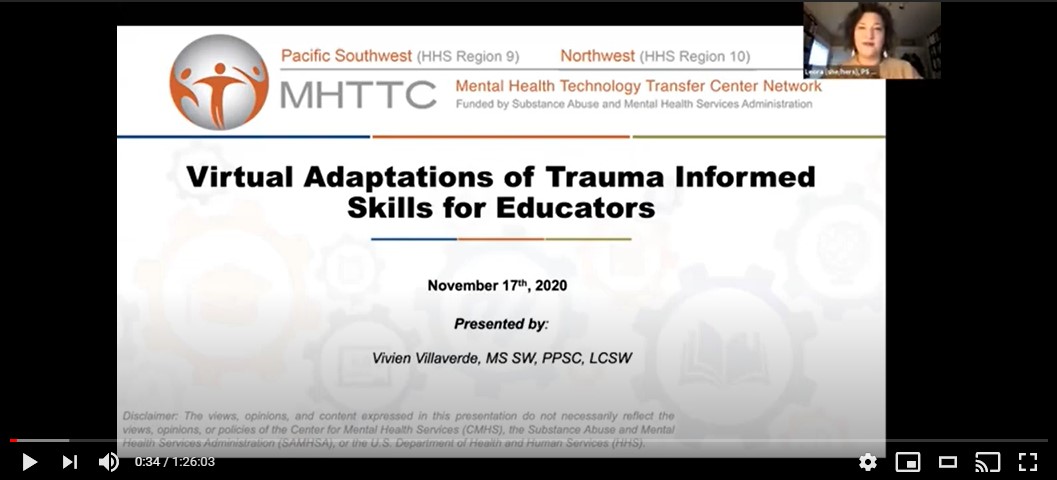
This webinar will be a 90-minute overview of the Trauma-informed Skills for Educators (TISE) Curriculum. The TISE intervention is designed to enhance educators' knowledge about trauma and its impact on students, as well as enhance educators' ability to engage with youth who've been exposed to trauma. The training addresses various types of trauma, the neurological impact of trauma on students, signs, and symptoms of trauma, and describes how trauma can manifest in the classroom and impact student learning. Additionally, the webinar provides concrete strategies to help educators support students in a more trauma-responsive way including: foster a trauma-sensitive classroom climate, communicate with students about trauma, de-escalate disruptive incidents; and foster trauma responsiveness throughout the school community. Virtual adaptations to these skills will be addressed.
Objectives
Resources
 Vivien Villaverde, MS SW, PPSC, LCSW, is a Clinical Associate Professor in the Field Education Department of the University of Southern California Suzanne Dworak-Peck School of Social Work and a member of the Treatment and Services Adaptation Center for Schools. She is a trained School Social Worker who was affiliated with the Los Angeles Unified School District for about 10 years. Prof. Villaverde has expertise in trauma-informed intervention, disaster/crisis response and trauma-responsive program development. She has extensive background in collaboration and education systems change. Her expertise includes training and consultation with school districts in trauma-responsive transformation including program development, EBP training, and policy development. Prof. Villaverde collaborates with the California Department of Education and has partnered internationally with South Korea and the Republic of the Philippines. In addition, she uses the “Social Responses to the Human Impacts of Climate Change” Grand Challenge in her disaster response planning work in Asia. She is also the Teaching Institution (TI) Coordinator at the School of Social Work. As the Coordinator, she engages in different innovation to promote university-community partnership for quality MSW internship and for community capacity-building.
Vivien Villaverde, MS SW, PPSC, LCSW, is a Clinical Associate Professor in the Field Education Department of the University of Southern California Suzanne Dworak-Peck School of Social Work and a member of the Treatment and Services Adaptation Center for Schools. She is a trained School Social Worker who was affiliated with the Los Angeles Unified School District for about 10 years. Prof. Villaverde has expertise in trauma-informed intervention, disaster/crisis response and trauma-responsive program development. She has extensive background in collaboration and education systems change. Her expertise includes training and consultation with school districts in trauma-responsive transformation including program development, EBP training, and policy development. Prof. Villaverde collaborates with the California Department of Education and has partnered internationally with South Korea and the Republic of the Philippines. In addition, she uses the “Social Responses to the Human Impacts of Climate Change” Grand Challenge in her disaster response planning work in Asia. She is also the Teaching Institution (TI) Coordinator at the School of Social Work. As the Coordinator, she engages in different innovation to promote university-community partnership for quality MSW internship and for community capacity-building.
The Northwest MHTTC and the Pacific Southwest MHTTC are continuing our partnership to provide and extend deeper technical assistance on the Interconnected Systems Framework (ISF).
Interconnected Systems Framework (ISF) is a structure and process that maximizes effectiveness and efficiency by blending the strengths of school and community mental health with strengths of the multi-tiered framework of PBIS (Barrett, Eber, Weist, 2013)
This past year, we offered three webinars on the Interconnected Systems Framework (see below for recordings) and followed the learning series up with monthly discussion hours led by Susan Barrett and field leaders from our region.
This year, we are offering more programming to deepen your ISF work and contextualize ISF to this moment of COVID-19 and beyond. Our fall offering is made up of four modules and ends with a town hall for you to be able to ask faculty your questions and resource one another. Each module includes teaching from Susan Barrett and field leaders on ISF systems, and USC faculty on ISF practices.
Want more information and school mental health resources? Visit the Northwest MHTTC's School Mental Health page and sign up for our monthly newsletter for regular updates about events, trainings, and resources available to the Northwest region.